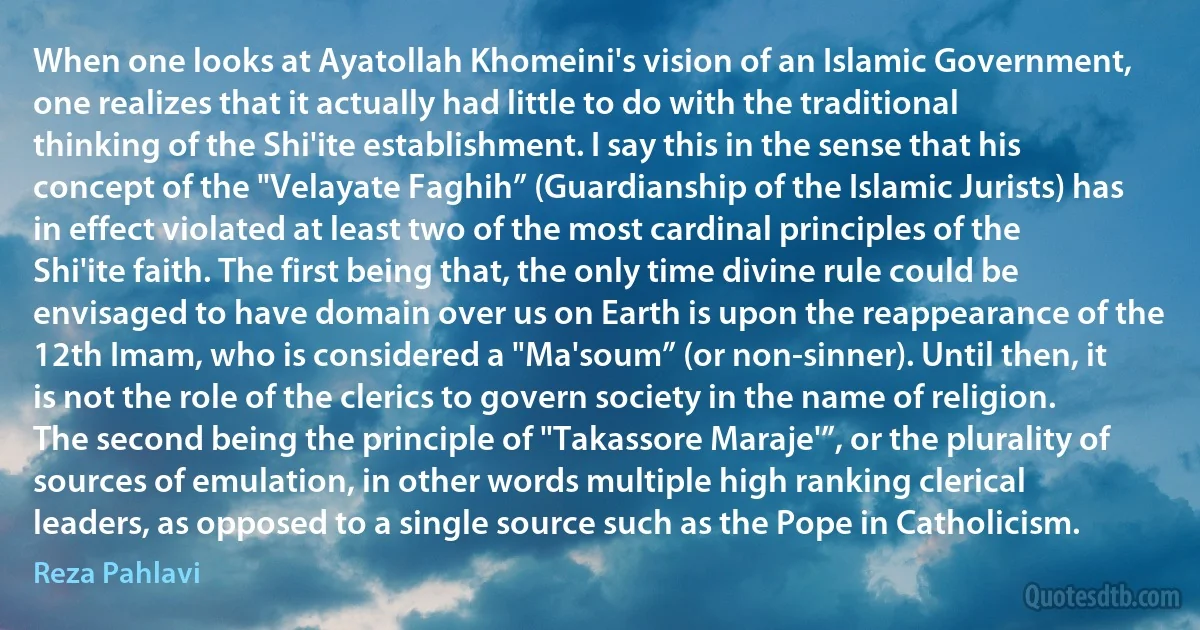
When one looks at Ayatollah Khomeini's vision of an Islamic Government, one realizes that it actually had little to do with the traditional thinking of the Shi'ite establishment. I say this in the sense that his concept of the "Velayate Faghih” (Guardianship of the Islamic Jurists) has in effect violated at least two of the most cardinal principles of the Shi'ite faith. The first being that, the only time divine rule could be envisaged to have domain over us on Earth is upon the reappearance of the 12th Imam, who is considered a "Ma'soum” (or non-sinner). Until then, it is not the role of the clerics to govern society in the name of religion. The second being the principle of "Takassore Maraje'”, or the plurality of sources of emulation, in other words multiple high ranking clerical leaders, as opposed to a single source such as the Pope in Catholicism.
Reza PahlaviRelated topics
catholicism clerical concept divine earth establishment faith govern government guardianship high least name plurality pope ranking reappearance religion rule say second sense single source thinking time traditional vision words ayatollah islamic looksRelated quotes
...the principle of nationality and the principle of reverence for antiquity-the principle of what I may call local patriotism-is not only an ennobling thing in itself, but has a great economic value. ... The attachment to your country, the attachment among British subjects to Britain, but also the attachment among Welsh-born people to Wales, has in it, in some degrees, the nature both of an appeal to energy and an incentive to its development, and likewise, no few elements of a moral standard; for the Welshman, go where he may, will be unwilling to disgrace the name. It is a matter of familiar observation that even in the extremest east of Europe, wherever free institutions have supplanted a state of despotic government, the invariable effect has been to administer an enormous stimulus to the industrious activity of the country.

William Ewart Gladstone
In a capitalist democracy there are essentially two methods by which social choices can be made: voting, typically used to make ‘political' decisions, and the market mechanism, typically used to make ‘economic' decisions. In the emerging democracies with mixed economic systems Great Britain, France, and Scandinavia, the same two modes of making social choices prevail, though more scope is given to the method of voting and to decisions based directly or indirectly on it and less to the rule of the price mechanism. Elsewhere in the world, and even in smaller social units within the democracies, the social decisions are sometimes made by single individuals or small groups and sometimes (more and more rarely in this modern world) by a widely encompassing set of traditional rules for making the social choice in any given situation, for example, a religious code.

Kenneth Arrow
In my talks with the African Nationalist leaders...I regarded it as my duty to remove from their minds any idea or any hope they might have had that Rhodesia's constitutional problems were going to be solved by an assertion of military power on our part, whether for the purposes of suspending or amending the 1961 Constitution, of imposing majority rule tomorrow or any other time-or for that matter of dealing with the situation that would follow an illegal assertion of independence. To quote the words I used to them: If there are those who are thinking in terms of a thunderbolt hurtling from the sky and destroying their enemies, a thunderbolt in the shape of the Royal Air Force, let me say that thunderbolt will not be coming, and to continue in this delusion wastes valuable time, and misdirects valuable energies.

Harold Wilson
The Socialistic schools, prescinding from the barbarous multitudes which follow them, and considered in their doctors and masters, are far superior to the Liberal school, just because they go straight to all the great problems and questions, and because they always propose a peremptory and decisive solution. Socialism is strong, only because it is a theology; and it is destructive, only because it is a satanic theology. The Socialistic schools, in as much as they are theological, will prevail over the Liberal school, in as much as it is anti-theological and sceptical; and inasmuch as they are satanic, they will succumb before the Catholic school, which is at once theological and divine. Their instincts must be in accord with our assertions, if we consider that they treasure up their hatred for Catholicism, while they have only contempt for Liberalism.

Juan Donoso Cortés
Rosa Luxemburg is an outstanding example of a type of mind that is often met with in the history of Marxism and appears to be specially attracted by the Marxist outlook. It is characterized by slavish submission to authority, together with a belief that in that submission the values of scientific thought can be preserved. No doctrine was so well suited as Marxism to satisfy both these attitudes, or to provide a mystification combining extreme dogmatism with the cult of "scientific” thinking, in which the disciple could find mental and spiritual peace. Marxism thus played the part of a religion for the intelligentsia, which did not prevent some of them, like Rosa Luxemburg herself, from trying to improve the deposit of faith by reverting to first principles, thus strengthening their own belief that they were independent of dogma. (pp. 94-5)

Leszek Kołakowski
